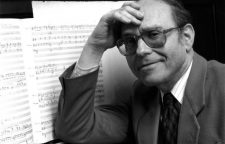Saturday, October 21, 1995
- 1995-1996 Season
- Symphony Orchestra
- Conductor: Jed Gaylin
- Works Performed:
- The Fixed Desire of the Human Heart by Samuel Adler
- Kindertotenlieder by Gustav Mahler
- Stars in the Dust Cantata by Samuel Adler
- Featured Artists: Sharon Steinberg Samuel Adler Roland Flint Randal Woodfield Johns Hopkins Choral Society
- Venue: Shriver Hall
- Time: 8:00 pm
Concert Details

Program
Symphonic Concert • Jed Gaylin, Music Director
Shriver Hall
Samuel Adler: The Fixed Desire of the Human Heart
Gustav Mahler: Kindertotenlieder
Randal Woodfield, baritone
Samuel Adler: Stars in the Dust Cantata
A Cantata in remembrance of Kristallnacht
Text by Samuel Rosenbaum
Sharon Steinberg, soprano
Mikhail Manevich, tenor
Randal Woodfield, baritone
Roland Flint, narrator
Johns Hopkins Choral Society
Samuel Adler, guest conductor
The Fixed Desire of the Human Heart
Samuel Adler
Samuel Adler’s The Fixed Desire of the Human Heart, “An Homage to Woodrow Wilson’s Vision of World Peace”, commissioned by Adler’s students of 32 years teaching at Eastman, is something of a prayer or meditation, freely using the chorale “In Your Mercy grant us Peace.” The wistful opening leads to an agitated middle section, suggesting that even in times of peace, thoughts of war and its bitter memories remain, and in fact are necessary motivation to remain vigilant in the struggle for peace. This vigilance is clearly represented by Wilson’s quote which appears at the front of the score:
“I consider the agitation for international arbitration and world peace a deep-seated and permanent thing, representing the fixed and universal desire of the human heart.”
The music ends as it began in its pulsing, contemplative mood. This concise, intense work sets the tone for the rest of the concert (which included Mahler’s Kindertotenlieder ) in which consolation and resolve surface against a backdrop of horror and grief.
Stars in the Dust
As a symbol of the universal significance of Stars in the Dust and the dreadful occasion which it commemorates, the world premiere of the cantata was held simultaneously in 12 major cities across the United States in November 1988. This work explores the horrors and chilling implications of Kristallnacht as a prelude to the even greater atrocities of the Holocaust. Yet while the composer in his portrayal has not attempted to soften the fear of that night, the piece takes the listener through heart-felt emotional responses of anger, bewilderment, and ultimately consolation and resolve. The musical palette of the work is striking and varied, incorporating the most traditional elements of the Jewish liturgy as well as the strident sounds of the emergence of violence, and the uplifting harmonies of the final hymn of praise. Here are the words of the composer:
In order that the music would communicate the event more directly, I worked some pre-existing tunes into its fabric. The work begins with a motive most familiar to every German Jew, the intonation of the blessing over the Torah. This is a very different tune from the one we use in this country. It is quite Schubertian, based on a major triad. In contrast to this, the traditional chant for the Book of Lamentations frequently occurs, especially at the cadence of phrases….such favorites as Hodo al eretx, and Ki Mitziyon are heard, and at one point, to emphasize the symbiotic relationship which existed between Germans and Jews for many hundreds of years, I have placed a descant of the German national anthem, Deutschland, Deutschland uber Alles, which seemed to work perfectly, but towards the end, as in reality, “went sour…”The final portion of the work is dominated by two tunes associated with the destruction of the Temple in Jerusalem, for after all, Kristallnacht was the occasion of the destruction of every Jewish sanctuary in Germany. The very end of the piece is one of hope and hopeful reconciliation, for perhaps we all share, in some way, the guilt for this and the ensuing events by the fact that there was generally world apathy toward most of it, and perhaps from this commemoration will evolve a resolve that we have all learned to be on our guard to insure that “never again” any events like these will occur anywhere in the world against Jews or any other human beings.
—Jed Gaylin
